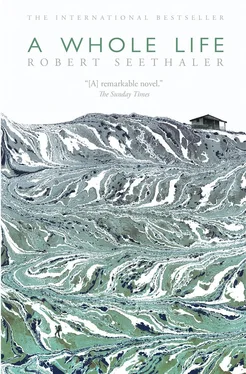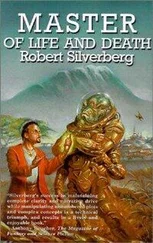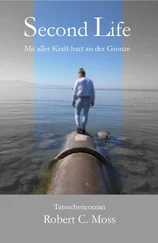Robert Seethaler - A Whole Life
Здесь есть возможность читать онлайн «Robert Seethaler - A Whole Life» весь текст электронной книги совершенно бесплатно (целиком полную версию без сокращений). В некоторых случаях можно слушать аудио, скачать через торрент в формате fb2 и присутствует краткое содержание. Год выпуска: 2015, Издательство: House of Anansi Press Inc, Жанр: Современная проза, на английском языке. Описание произведения, (предисловие) а так же отзывы посетителей доступны на портале библиотеки ЛибКат.
- Название:A Whole Life
- Автор:
- Издательство:House of Anansi Press Inc
- Жанр:
- Год:2015
- ISBN:нет данных
- Рейтинг книги:4 / 5. Голосов: 1
-
Избранное:Добавить в избранное
- Отзывы:
-
Ваша оценка:
- 80
- 1
- 2
- 3
- 4
- 5
A Whole Life: краткое содержание, описание и аннотация
Предлагаем к чтению аннотацию, описание, краткое содержание или предисловие (зависит от того, что написал сам автор книги «A Whole Life»). Если вы не нашли необходимую информацию о книге — напишите в комментариях, мы постараемся отыскать её.
Set in the mid-twentieth century and told with beauty and tenderness, his story is one of man's relationship with an ancient landscape, of the value of solitude, the arrival of the modern world, and above all, of the moments, great and small, that make us who we are.
A Whole Life — читать онлайн бесплатно полную книгу (весь текст) целиком
Ниже представлен текст книги, разбитый по страницам. Система сохранения места последней прочитанной страницы, позволяет с удобством читать онлайн бесплатно книгу «A Whole Life», без необходимости каждый раз заново искать на чём Вы остановились. Поставьте закладку, и сможете в любой момент перейти на страницу, на которой закончили чтение.
Интервал:
Закладка:
At the end of March 1935, Egger and Marie were sitting on the threshold after sunset, looking out over the valley. It had snowed a lot in the last few weeks, but for two days now a sudden warm spell had been announcing the arrival of spring: all around the snow was melting, and already during the day the baby swallows’ beaks were peeping out over the edge of their nest under the eaves. From morning till night the adult swallows flew to their young with worms and insects in their beaks, and Egger commented that ‘all that bird shit would be enough to lay a new foundation’. But Marie liked the birds; she thought of them as fluttering good-luck charms keeping evil away from the house, so he resigned himself to the mess and the nest was allowed to stay.
Egger’s gaze travelled all across the village and the opposite side of the valley. In many houses the windows were already lit up. The valley had had electricity for a while now and some days, here or there, an old farmer could be seen sitting before a lamp in his room and staring in astonishment into its bright glow. The lights were already on in the workers’ camp, too, and smoke was rising almost vertically from narrow iron pipes into the cloudy evening sky. From a distance it looked as if the clouds were attached to the roofs by thin threads, suspended over the valley like huge, shapeless balloons. Blue Liesl’s cabins were still, and Egger thought of the two maintenance engineers who right at this moment were crawling around the engine room with their little cans of oil, lubricating the machinery. Another cable car had already been completed, and they had started to cut an aisle in the forest in the neighbouring valley for a third, longer and wider than the first two put together. Egger looked at his steep, snow-covered land spread out before him. He felt a small, warm wave of contentment well up inside, and would have liked to leap to his feet and shout out his happiness to the world, but Marie was sitting there so quiet and still that he too remained seated.
‘Maybe we can have some more vegetables,’ he said. ‘I could extend the garden. Behind the house, I mean. Potatoes, onions and things.’
‘Yes, that’s not a bad idea, Andreas,’ she said. Egger looked at her. He couldn’t recall her ever having addressed him by name. It was the first time, and it felt strange. She passed the back of her hand across her brow and he looked away again. ‘We’ll have to see whether all that can grow in soil like this,’ he said, poking the tip of his shoe into the frozen earth.
‘Something’s going to grow. And it’s going to be something wonderful,’ she said. Egger looked at her again. She was leaning back slightly, and her face was barely visible in the shadow of the doorway. All he could make out were her eyes, two shining drops in the darkness.
‘Why are you looking like that?’ he asked quietly. Suddenly he felt uneasy, sitting there beside this woman who was at the same time both so familiar to him and so alien. She leaned forward a little and placed her hands in her lap. They seemed to him unusually delicate and white. Impossible that just a few hours ago they had been splitting firewood with an axe. He stretched out his arm and touched Marie’s shoulder, and although he was still looking at the white hands in her lap, he knew that she was smiling.
In the night Egger was woken by a peculiar noise. It was no more than an intimation, a soft whisper stealing around the walls. He lay in the dark and listened. He felt the warmth of his wife beside him and heard the quiet sounds of her breathing. Eventually he got up and went outside. The warm föhn wind buffeted against him, almost wrenching the door out of his hand. Black clouds were racing across the night sky, a pale, shapeless moon flickering between them. Egger trudged a little way up the field. The snow was heavy and wet and the meltwater was burbling all around. He thought about the vegetables and about all the other things he needed to do. The soil didn’t yield much, but it would be enough. They could have a goat or perhaps even a cow, he thought, for the milk. He stopped. Somewhere way up high he heard a sound, as if something deep inside the mountain were splitting with a sigh. Then he heard a deep, swelling rumble and a moment later the ground beneath his feet began to tremble. Suddenly he was cold. Within seconds the rumbling had increased to a high, piercing note. Egger stood stock-still and heard the mountain start to sing. Then he saw something big and black hurtle silently past about twenty metres away and before he had even grasped that it was a tree trunk he began to run. He ran back through the deep snow towards the house, calling to Marie, but an instant later something seized him and lifted him up. He felt himself being carried away and the last thing he saw before a dark wave engulfed him was his legs, sticking up above him into the sky as if disconnected from the rest of his body.
When Egger came to, the clouds had disappeared and in the night sky the moon was a radiant white. All around the mountains soared up in its light; their icy crests looked as if they had been punched from a sheet of metal, their sharpness and clarity seeming to cut into the sky. Egger was lying on his back at an angle. He could move his head and arms, but his legs were buried up to the hips in snow. He began to dig. Using both hands he shovelled and scratched his legs out of the snow and when he had freed them he saw them lying there, stunned, as cold and alien as two planks of wood. He pounded his thighs with his fists. ‘Don’t abandon me now,’ he said, and finally gave a hoarse laugh as pain shot into them along with the blood. He tried to stand, but immediately buckled again. He cursed his good-for-nothing legs and cursed his whole body, weaker than that of a little child. ‘Come on, up you get!’ he said to himself, and when he tried again he managed it, and stood. The landscape had changed. The avalanche had buried trees and rocks beneath it and levelled the ground. The deep snow lay like a vast blanket in the moonlight. He tried to get his bearings from the mountains. As far as he could tell, he was about three hundred metres below his cabin, which must be up there behind the mound of piled-up snow. He set off. The going was slower than he had thought: the avalanche snow was unpredictable, rock-hard in one place as if fused with the bedrock, soft and powdery as icing sugar just two steps further on. The pain was bad. He was particularly worried about his good leg. It felt as if there was an iron thorn stuck in his thigh, boring deeper and deeper into his flesh with every step he took. He thought of the young swallows. Hopefully the shock wave hadn’t got them. The nest was in a well-protected spot, though, and he had built the roof frame sturdy. Still, he would need to strengthen the crossbeams underneath; he would weigh the roof down with stones and protect the back with a supporting wall of interlocking rock fragments that he would work deep into the slope. ‘But the stones must be flat!’ he said aloud to himself. He stopped for a moment and listened, but there was hardly a sound. The föhn wind had vanished, leaving only a delicate breeze that tingled on the skin. He walked on. The world around him was silent and dead. For a moment he had the feeling that he was the last person on earth, or at least the last person in the valley. He laughed. ‘What nonsense,’ he said, and walked on. The last stretch before the mound of snow was steep and he had to crawl on all fours. Beneath his fingers the snow was crumbly and seemed to him curiously warm. Strangely, the pain in his legs had now vanished, but the cold still sat deep in his bones, and they felt as light and brittle as glass. ‘I’m nearly there,’ he said to himself or to Marie or to anyone, but even as he did so he knew there was no longer anyone to hear him, and when he heaved his body up over the crest of the hill he uttered a loud sob. He knelt in the snow and surveyed the moonlit expanse on which his house had stood. He shouted his wife’s name into the silence: ‘Marie! Marie!’ He stood up and walked aimlessly around his piece of land. Beneath a knee-deep layer of powder the snow was hard and smooth, as if pressed by a roller. Shingles, stones and broken wood lay scattered all around. He recognized the iron ring of his rain barrel and, beside it, one of his boots. In one slightly elevated spot a piece of the chimney stuck up out of the ground. Egger went on a couple of steps to where he guessed the entrance must be. He fell on his knees and began to dig. He dug until his hands bled and the snow turned dark beneath him. An hour later, when he had got down about one and a half metres, he felt beneath his raw fingertips, as if embedded in cement, a roof beam that the avalanche had torn away, and stopped digging. He sat back and stared up into the night sky. Then he fell forward and laid his face in the blood-drenched snow.
Читать дальшеИнтервал:
Закладка:
Похожие книги на «A Whole Life»
Представляем Вашему вниманию похожие книги на «A Whole Life» списком для выбора. Мы отобрали схожую по названию и смыслу литературу в надежде предоставить читателям больше вариантов отыскать новые, интересные, ещё непрочитанные произведения.
Обсуждение, отзывы о книге «A Whole Life» и просто собственные мнения читателей. Оставьте ваши комментарии, напишите, что Вы думаете о произведении, его смысле или главных героях. Укажите что конкретно понравилось, а что нет, и почему Вы так считаете.











